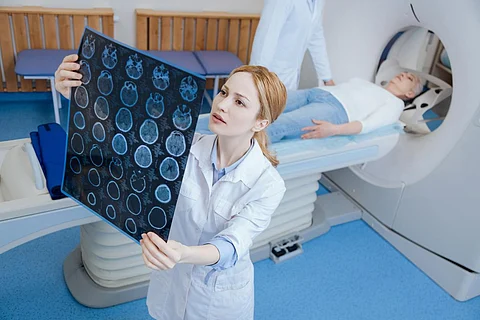FRIDAY, Dec. 27, 2024 (HealthDay News) -- Alzheimer’s disease experts have updated their diagnosis guidelines for the first time in more than 20 years, laying out how family doctors and brain specialists can best detect dementia.
The guidelines call for the use of three general criteria to assess a person’s brain health, according to a report published Dec. 23, 2024, in the journal Alzheimer’s & Dementia:
The patient’s overall level of cognitive impairment
Specific symptoms they’re suffering, which can involve memory, reasoning, language or mood
Brain diseases most likely to be causing these symptoms
These three areas of diagnosis were intentionally left broad, so that new tests can be incorporated into the guidelines as researchers learn more about dementia and Alzheimer’s, Dr. Alireza Atri, a lecturer on neurology at Harvard Medical School, said in a news release from the Alzheimer’s Association.
“This first U.S. interdisciplinary national evaluation guideline, designed for broad clinical settings, provides a comprehensive foundation summarizing a high-quality and personalized process within which specific tests are slotted and can be updated as the field evolves,” Atri said.
“Some details of the guideline will likely require modification as new tools and biomarkers become sufficiently validated for appropriate clinical use in real-world practice,” Atri added.
Research into Alzheimer’s and dementia has been steadily breaking new ground, but the current guidelines for diagnosing cognitive decline are more than two decades old, experts noted.
In addition, the old guidelines were aimed at specialists in neurology or dementia, and gave no direction for family doctors whose patients might be concerned about their brain health.
This led the Alzheimer’s Association to convene a workgroup to revamp the process for assessing a person’s brain health. The group included experts from multiple medical disciplines, including primary care doctors and specialists.
“These guidelines are important because they guide clinicians in the evaluation of memory complaints, which could have many underlying causes,” Maria Carrillo, chief science officer for the Alzheimer’s Association, said in a news release. “That is the necessary start for an early and accurate Alzheimer’s diagnosis. In addition, these guidelines provide clinicians information about other underlying causes that may contribute to the memory complaints.”
A comprehensive evaluation of a person’s brain health might include:
Tests of memory and thinking
Assessment of risk factors like family history of dementia, high blood pressure and smoking
Reviewing symptoms from daily life that might indicate cognitive decline
MRI or CT brain scans and other lab tests
Newer tests or scans can be added into this framework as they are developed, the workgroup said.
“With this guideline, we expand the scope of prior guidelines by providing recommendations for practicing clinicians on the process from start to finish,” Dr. Brad Dickerson, director of the Massachusetts General Hospital Frontotemporal Disorders Unit, said in a news release.
“We recommend that medical professionals begin by making sure their thinking about the goals of the evaluation aligns with that of the patient, which usually requires a discussion to educate the patient on the specific steps of the process."
“Then we outline the steps involved in obtaining information about symptoms and examination, followed by a variety of diagnostic tests tailored to the patient, and summarize best practices regarding the diagnostic disclosure process,” Dickerson concluded.
More information
The National Institute on Aging has more about dementia.
SOURCE: Alzheimer’s & Dementia, journal study, Dec. 23, 2024; Alzheimer’s Association, news release, Dec. 23, 2024


